Cross-Cultural Management Report: Leadership and Culture Analysis
VerifiedAdded on 2022/12/05
|9
|2862
|309
Report
AI Summary
This report analyzes the cross-cultural management challenges faced in the Hydro Generation case study involving a dam construction project in Tanzania. The report explores issues related to national culture, leadership styles, and motivation/HRM practices. It examines the impact of Hofstede's cultural dimensions, particularly individualism vs. collectivism and power distance, on the project's management. The analysis focuses on the leadership approach of Brett Jones and its alignment (or misalignment) with Tanzanian cultural norms, including the adoption of autocratic leadership and the practice of nepotism. The report also delves into the application of leadership theories such as Lewin's and Blake and Mouton's, and Herzberg’s two-factor motivation theory to understand Jones's actions and their consequences. Finally, the report provides recommendations for addressing the identified problems, including suggestions for adapting leadership styles and HRM practices to the local context.

Cross cultural
management
management
Paraphrase This Document
Need a fresh take? Get an instant paraphrase of this document with our AI Paraphraser
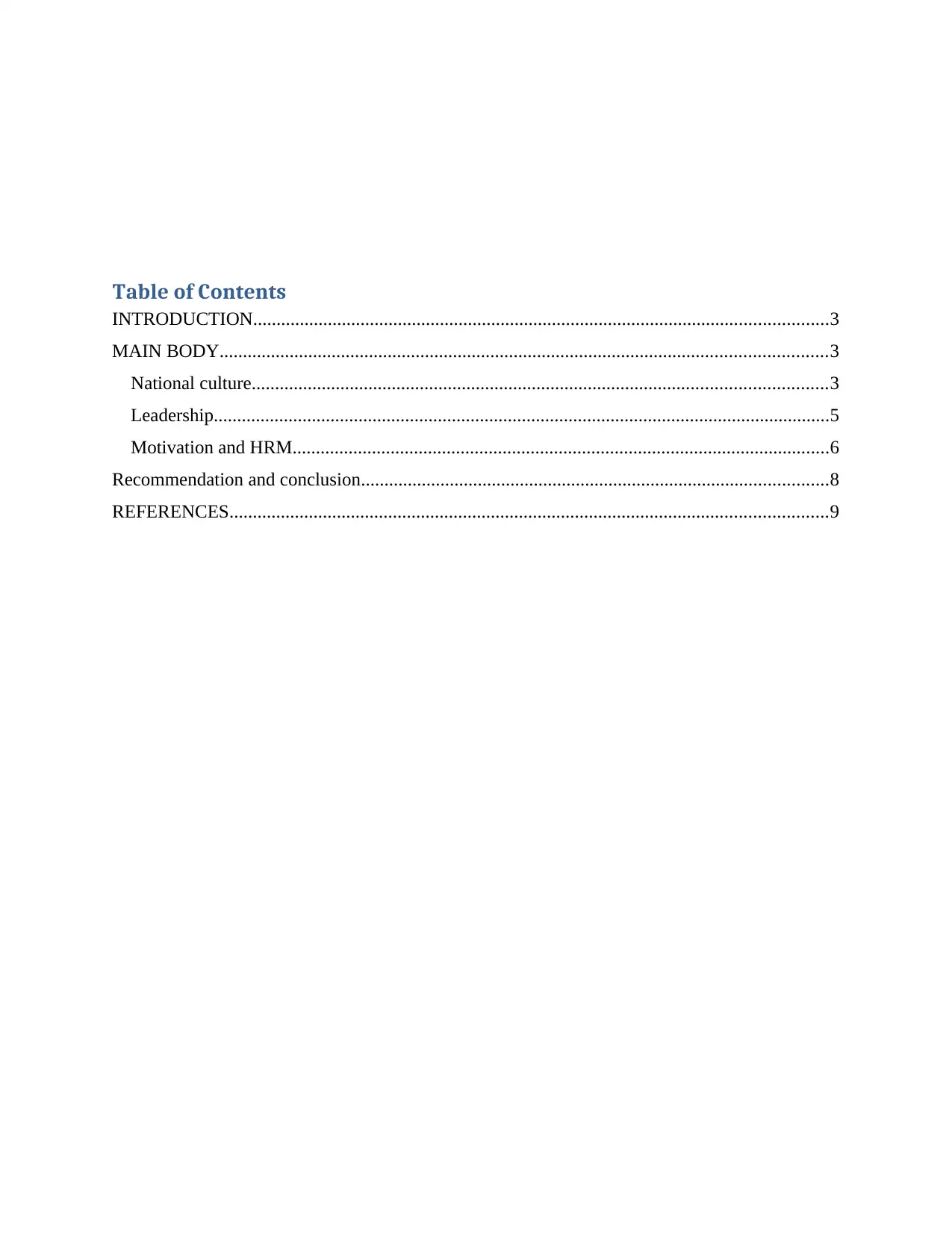
Table of Contents
INTRODUCTION...........................................................................................................................3
MAIN BODY..................................................................................................................................3
National culture...........................................................................................................................3
Leadership....................................................................................................................................5
Motivation and HRM...................................................................................................................6
Recommendation and conclusion....................................................................................................8
REFERENCES................................................................................................................................9
INTRODUCTION...........................................................................................................................3
MAIN BODY..................................................................................................................................3
National culture...........................................................................................................................3
Leadership....................................................................................................................................5
Motivation and HRM...................................................................................................................6
Recommendation and conclusion....................................................................................................8
REFERENCES................................................................................................................................9
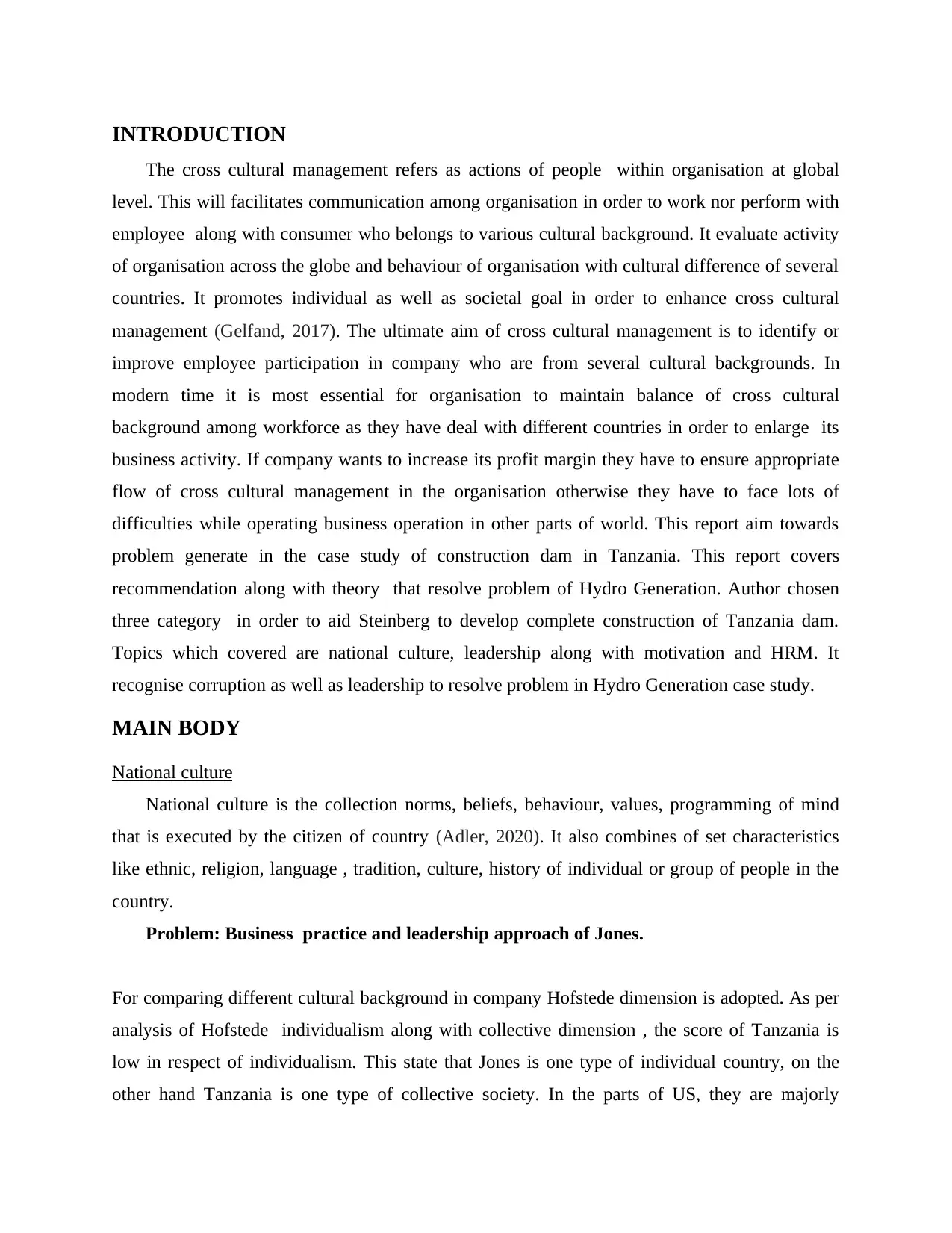
INTRODUCTION
The cross cultural management refers as actions of people within organisation at global
level. This will facilitates communication among organisation in order to work nor perform with
employee along with consumer who belongs to various cultural background. It evaluate activity
of organisation across the globe and behaviour of organisation with cultural difference of several
countries. It promotes individual as well as societal goal in order to enhance cross cultural
management (Gelfand, 2017). The ultimate aim of cross cultural management is to identify or
improve employee participation in company who are from several cultural backgrounds. In
modern time it is most essential for organisation to maintain balance of cross cultural
background among workforce as they have deal with different countries in order to enlarge its
business activity. If company wants to increase its profit margin they have to ensure appropriate
flow of cross cultural management in the organisation otherwise they have to face lots of
difficulties while operating business operation in other parts of world. This report aim towards
problem generate in the case study of construction dam in Tanzania. This report covers
recommendation along with theory that resolve problem of Hydro Generation. Author chosen
three category in order to aid Steinberg to develop complete construction of Tanzania dam.
Topics which covered are national culture, leadership along with motivation and HRM. It
recognise corruption as well as leadership to resolve problem in Hydro Generation case study.
MAIN BODY
National culture
National culture is the collection norms, beliefs, behaviour, values, programming of mind
that is executed by the citizen of country (Adler, 2020). It also combines of set characteristics
like ethnic, religion, language , tradition, culture, history of individual or group of people in the
country.
Problem: Business practice and leadership approach of Jones.
For comparing different cultural background in company Hofstede dimension is adopted. As per
analysis of Hofstede individualism along with collective dimension , the score of Tanzania is
low in respect of individualism. This state that Jones is one type of individual country, on the
other hand Tanzania is one type of collective society. In the parts of US, they are majorly
The cross cultural management refers as actions of people within organisation at global
level. This will facilitates communication among organisation in order to work nor perform with
employee along with consumer who belongs to various cultural background. It evaluate activity
of organisation across the globe and behaviour of organisation with cultural difference of several
countries. It promotes individual as well as societal goal in order to enhance cross cultural
management (Gelfand, 2017). The ultimate aim of cross cultural management is to identify or
improve employee participation in company who are from several cultural backgrounds. In
modern time it is most essential for organisation to maintain balance of cross cultural
background among workforce as they have deal with different countries in order to enlarge its
business activity. If company wants to increase its profit margin they have to ensure appropriate
flow of cross cultural management in the organisation otherwise they have to face lots of
difficulties while operating business operation in other parts of world. This report aim towards
problem generate in the case study of construction dam in Tanzania. This report covers
recommendation along with theory that resolve problem of Hydro Generation. Author chosen
three category in order to aid Steinberg to develop complete construction of Tanzania dam.
Topics which covered are national culture, leadership along with motivation and HRM. It
recognise corruption as well as leadership to resolve problem in Hydro Generation case study.
MAIN BODY
National culture
National culture is the collection norms, beliefs, behaviour, values, programming of mind
that is executed by the citizen of country (Adler, 2020). It also combines of set characteristics
like ethnic, religion, language , tradition, culture, history of individual or group of people in the
country.
Problem: Business practice and leadership approach of Jones.
For comparing different cultural background in company Hofstede dimension is adopted. As per
analysis of Hofstede individualism along with collective dimension , the score of Tanzania is
low in respect of individualism. This state that Jones is one type of individual country, on the
other hand Tanzania is one type of collective society. In the parts of US, they are majorly
⊘ This is a preview!⊘
Do you want full access?
Subscribe today to unlock all pages.

Trusted by 1+ million students worldwide
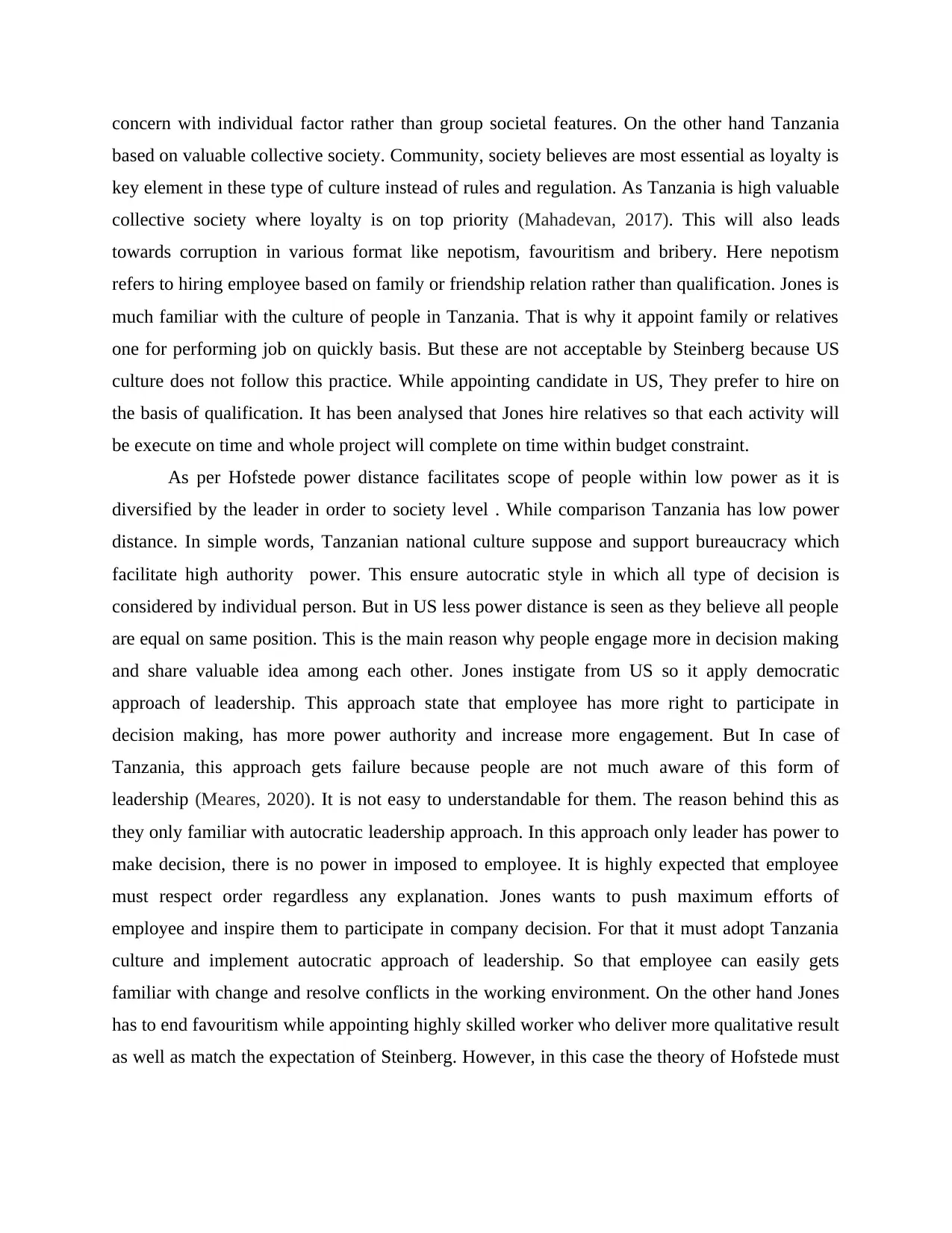
concern with individual factor rather than group societal features. On the other hand Tanzania
based on valuable collective society. Community, society believes are most essential as loyalty is
key element in these type of culture instead of rules and regulation. As Tanzania is high valuable
collective society where loyalty is on top priority (Mahadevan, 2017). This will also leads
towards corruption in various format like nepotism, favouritism and bribery. Here nepotism
refers to hiring employee based on family or friendship relation rather than qualification. Jones is
much familiar with the culture of people in Tanzania. That is why it appoint family or relatives
one for performing job on quickly basis. But these are not acceptable by Steinberg because US
culture does not follow this practice. While appointing candidate in US, They prefer to hire on
the basis of qualification. It has been analysed that Jones hire relatives so that each activity will
be execute on time and whole project will complete on time within budget constraint.
As per Hofstede power distance facilitates scope of people within low power as it is
diversified by the leader in order to society level . While comparison Tanzania has low power
distance. In simple words, Tanzanian national culture suppose and support bureaucracy which
facilitate high authority power. This ensure autocratic style in which all type of decision is
considered by individual person. But in US less power distance is seen as they believe all people
are equal on same position. This is the main reason why people engage more in decision making
and share valuable idea among each other. Jones instigate from US so it apply democratic
approach of leadership. This approach state that employee has more right to participate in
decision making, has more power authority and increase more engagement. But In case of
Tanzania, this approach gets failure because people are not much aware of this form of
leadership (Meares, 2020). It is not easy to understandable for them. The reason behind this as
they only familiar with autocratic leadership approach. In this approach only leader has power to
make decision, there is no power in imposed to employee. It is highly expected that employee
must respect order regardless any explanation. Jones wants to push maximum efforts of
employee and inspire them to participate in company decision. For that it must adopt Tanzania
culture and implement autocratic approach of leadership. So that employee can easily gets
familiar with change and resolve conflicts in the working environment. On the other hand Jones
has to end favouritism while appointing highly skilled worker who deliver more qualitative result
as well as match the expectation of Steinberg. However, in this case the theory of Hofstede must
based on valuable collective society. Community, society believes are most essential as loyalty is
key element in these type of culture instead of rules and regulation. As Tanzania is high valuable
collective society where loyalty is on top priority (Mahadevan, 2017). This will also leads
towards corruption in various format like nepotism, favouritism and bribery. Here nepotism
refers to hiring employee based on family or friendship relation rather than qualification. Jones is
much familiar with the culture of people in Tanzania. That is why it appoint family or relatives
one for performing job on quickly basis. But these are not acceptable by Steinberg because US
culture does not follow this practice. While appointing candidate in US, They prefer to hire on
the basis of qualification. It has been analysed that Jones hire relatives so that each activity will
be execute on time and whole project will complete on time within budget constraint.
As per Hofstede power distance facilitates scope of people within low power as it is
diversified by the leader in order to society level . While comparison Tanzania has low power
distance. In simple words, Tanzanian national culture suppose and support bureaucracy which
facilitate high authority power. This ensure autocratic style in which all type of decision is
considered by individual person. But in US less power distance is seen as they believe all people
are equal on same position. This is the main reason why people engage more in decision making
and share valuable idea among each other. Jones instigate from US so it apply democratic
approach of leadership. This approach state that employee has more right to participate in
decision making, has more power authority and increase more engagement. But In case of
Tanzania, this approach gets failure because people are not much aware of this form of
leadership (Meares, 2020). It is not easy to understandable for them. The reason behind this as
they only familiar with autocratic leadership approach. In this approach only leader has power to
make decision, there is no power in imposed to employee. It is highly expected that employee
must respect order regardless any explanation. Jones wants to push maximum efforts of
employee and inspire them to participate in company decision. For that it must adopt Tanzania
culture and implement autocratic approach of leadership. So that employee can easily gets
familiar with change and resolve conflicts in the working environment. On the other hand Jones
has to end favouritism while appointing highly skilled worker who deliver more qualitative result
as well as match the expectation of Steinberg. However, in this case the theory of Hofstede must
Paraphrase This Document
Need a fresh take? Get an instant paraphrase of this document with our AI Paraphraser
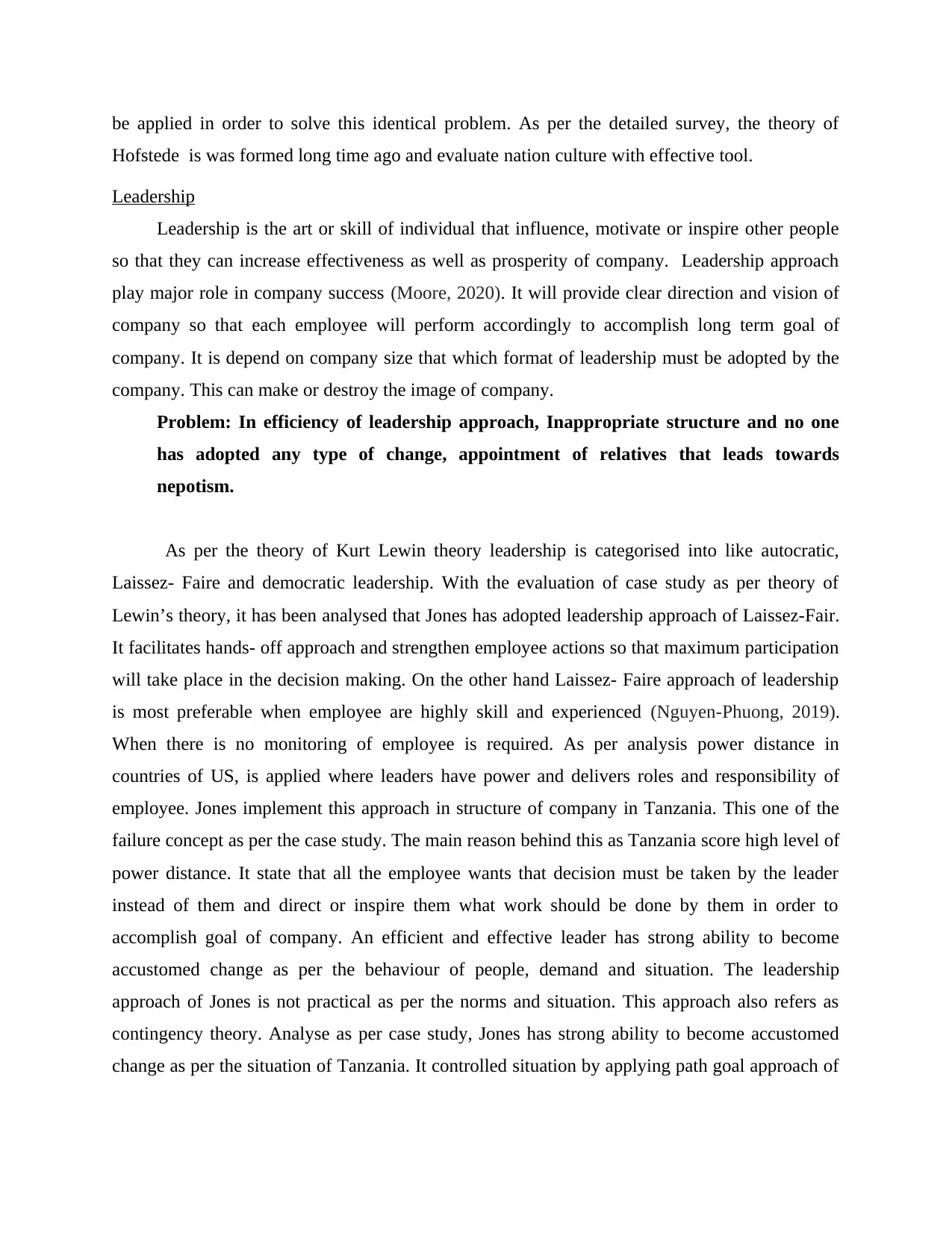
be applied in order to solve this identical problem. As per the detailed survey, the theory of
Hofstede is was formed long time ago and evaluate nation culture with effective tool.
Leadership
Leadership is the art or skill of individual that influence, motivate or inspire other people
so that they can increase effectiveness as well as prosperity of company. Leadership approach
play major role in company success (Moore, 2020). It will provide clear direction and vision of
company so that each employee will perform accordingly to accomplish long term goal of
company. It is depend on company size that which format of leadership must be adopted by the
company. This can make or destroy the image of company.
Problem: In efficiency of leadership approach, Inappropriate structure and no one
has adopted any type of change, appointment of relatives that leads towards
nepotism.
As per the theory of Kurt Lewin theory leadership is categorised into like autocratic,
Laissez- Faire and democratic leadership. With the evaluation of case study as per theory of
Lewin’s theory, it has been analysed that Jones has adopted leadership approach of Laissez-Fair.
It facilitates hands- off approach and strengthen employee actions so that maximum participation
will take place in the decision making. On the other hand Laissez- Faire approach of leadership
is most preferable when employee are highly skill and experienced (Nguyen-Phuong, 2019).
When there is no monitoring of employee is required. As per analysis power distance in
countries of US, is applied where leaders have power and delivers roles and responsibility of
employee. Jones implement this approach in structure of company in Tanzania. This one of the
failure concept as per the case study. The main reason behind this as Tanzania score high level of
power distance. It state that all the employee wants that decision must be taken by the leader
instead of them and direct or inspire them what work should be done by them in order to
accomplish goal of company. An efficient and effective leader has strong ability to become
accustomed change as per the behaviour of people, demand and situation. The leadership
approach of Jones is not practical as per the norms and situation. This approach also refers as
contingency theory. Analyse as per case study, Jones has strong ability to become accustomed
change as per the situation of Tanzania. It controlled situation by applying path goal approach of
Hofstede is was formed long time ago and evaluate nation culture with effective tool.
Leadership
Leadership is the art or skill of individual that influence, motivate or inspire other people
so that they can increase effectiveness as well as prosperity of company. Leadership approach
play major role in company success (Moore, 2020). It will provide clear direction and vision of
company so that each employee will perform accordingly to accomplish long term goal of
company. It is depend on company size that which format of leadership must be adopted by the
company. This can make or destroy the image of company.
Problem: In efficiency of leadership approach, Inappropriate structure and no one
has adopted any type of change, appointment of relatives that leads towards
nepotism.
As per the theory of Kurt Lewin theory leadership is categorised into like autocratic,
Laissez- Faire and democratic leadership. With the evaluation of case study as per theory of
Lewin’s theory, it has been analysed that Jones has adopted leadership approach of Laissez-Fair.
It facilitates hands- off approach and strengthen employee actions so that maximum participation
will take place in the decision making. On the other hand Laissez- Faire approach of leadership
is most preferable when employee are highly skill and experienced (Nguyen-Phuong, 2019).
When there is no monitoring of employee is required. As per analysis power distance in
countries of US, is applied where leaders have power and delivers roles and responsibility of
employee. Jones implement this approach in structure of company in Tanzania. This one of the
failure concept as per the case study. The main reason behind this as Tanzania score high level of
power distance. It state that all the employee wants that decision must be taken by the leader
instead of them and direct or inspire them what work should be done by them in order to
accomplish goal of company. An efficient and effective leader has strong ability to become
accustomed change as per the behaviour of people, demand and situation. The leadership
approach of Jones is not practical as per the norms and situation. This approach also refers as
contingency theory. Analyse as per case study, Jones has strong ability to become accustomed
change as per the situation of Tanzania. It controlled situation by applying path goal approach of
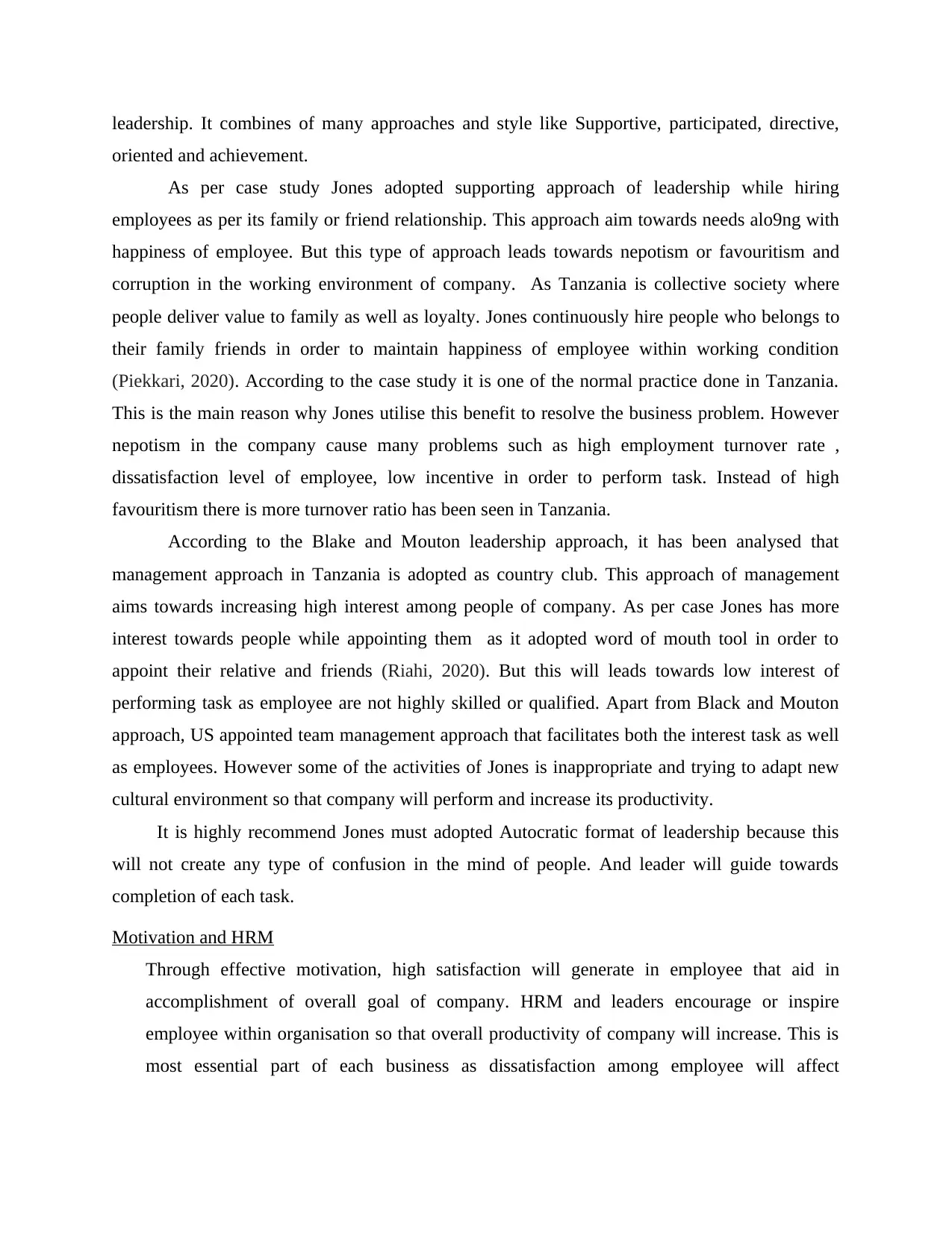
leadership. It combines of many approaches and style like Supportive, participated, directive,
oriented and achievement.
As per case study Jones adopted supporting approach of leadership while hiring
employees as per its family or friend relationship. This approach aim towards needs alo9ng with
happiness of employee. But this type of approach leads towards nepotism or favouritism and
corruption in the working environment of company. As Tanzania is collective society where
people deliver value to family as well as loyalty. Jones continuously hire people who belongs to
their family friends in order to maintain happiness of employee within working condition
(Piekkari, 2020). According to the case study it is one of the normal practice done in Tanzania.
This is the main reason why Jones utilise this benefit to resolve the business problem. However
nepotism in the company cause many problems such as high employment turnover rate ,
dissatisfaction level of employee, low incentive in order to perform task. Instead of high
favouritism there is more turnover ratio has been seen in Tanzania.
According to the Blake and Mouton leadership approach, it has been analysed that
management approach in Tanzania is adopted as country club. This approach of management
aims towards increasing high interest among people of company. As per case Jones has more
interest towards people while appointing them as it adopted word of mouth tool in order to
appoint their relative and friends (Riahi, 2020). But this will leads towards low interest of
performing task as employee are not highly skilled or qualified. Apart from Black and Mouton
approach, US appointed team management approach that facilitates both the interest task as well
as employees. However some of the activities of Jones is inappropriate and trying to adapt new
cultural environment so that company will perform and increase its productivity.
It is highly recommend Jones must adopted Autocratic format of leadership because this
will not create any type of confusion in the mind of people. And leader will guide towards
completion of each task.
Motivation and HRM
Through effective motivation, high satisfaction will generate in employee that aid in
accomplishment of overall goal of company. HRM and leaders encourage or inspire
employee within organisation so that overall productivity of company will increase. This is
most essential part of each business as dissatisfaction among employee will affect
oriented and achievement.
As per case study Jones adopted supporting approach of leadership while hiring
employees as per its family or friend relationship. This approach aim towards needs alo9ng with
happiness of employee. But this type of approach leads towards nepotism or favouritism and
corruption in the working environment of company. As Tanzania is collective society where
people deliver value to family as well as loyalty. Jones continuously hire people who belongs to
their family friends in order to maintain happiness of employee within working condition
(Piekkari, 2020). According to the case study it is one of the normal practice done in Tanzania.
This is the main reason why Jones utilise this benefit to resolve the business problem. However
nepotism in the company cause many problems such as high employment turnover rate ,
dissatisfaction level of employee, low incentive in order to perform task. Instead of high
favouritism there is more turnover ratio has been seen in Tanzania.
According to the Blake and Mouton leadership approach, it has been analysed that
management approach in Tanzania is adopted as country club. This approach of management
aims towards increasing high interest among people of company. As per case Jones has more
interest towards people while appointing them as it adopted word of mouth tool in order to
appoint their relative and friends (Riahi, 2020). But this will leads towards low interest of
performing task as employee are not highly skilled or qualified. Apart from Black and Mouton
approach, US appointed team management approach that facilitates both the interest task as well
as employees. However some of the activities of Jones is inappropriate and trying to adapt new
cultural environment so that company will perform and increase its productivity.
It is highly recommend Jones must adopted Autocratic format of leadership because this
will not create any type of confusion in the mind of people. And leader will guide towards
completion of each task.
Motivation and HRM
Through effective motivation, high satisfaction will generate in employee that aid in
accomplishment of overall goal of company. HRM and leaders encourage or inspire
employee within organisation so that overall productivity of company will increase. This is
most essential part of each business as dissatisfaction among employee will affect
⊘ This is a preview!⊘
Do you want full access?
Subscribe today to unlock all pages.

Trusted by 1+ million students worldwide
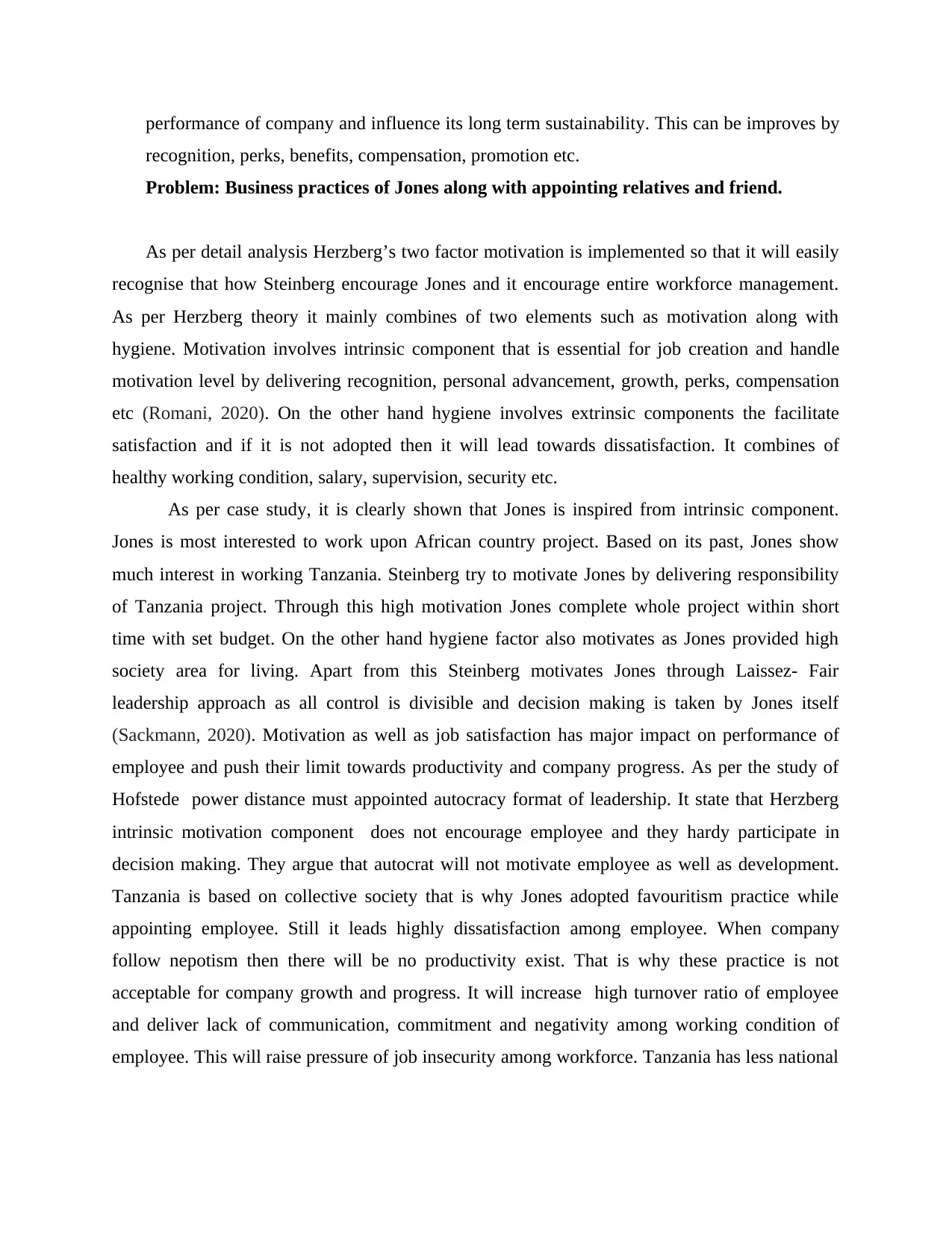
performance of company and influence its long term sustainability. This can be improves by
recognition, perks, benefits, compensation, promotion etc.
Problem: Business practices of Jones along with appointing relatives and friend.
As per detail analysis Herzberg’s two factor motivation is implemented so that it will easily
recognise that how Steinberg encourage Jones and it encourage entire workforce management.
As per Herzberg theory it mainly combines of two elements such as motivation along with
hygiene. Motivation involves intrinsic component that is essential for job creation and handle
motivation level by delivering recognition, personal advancement, growth, perks, compensation
etc (Romani, 2020). On the other hand hygiene involves extrinsic components the facilitate
satisfaction and if it is not adopted then it will lead towards dissatisfaction. It combines of
healthy working condition, salary, supervision, security etc.
As per case study, it is clearly shown that Jones is inspired from intrinsic component.
Jones is most interested to work upon African country project. Based on its past, Jones show
much interest in working Tanzania. Steinberg try to motivate Jones by delivering responsibility
of Tanzania project. Through this high motivation Jones complete whole project within short
time with set budget. On the other hand hygiene factor also motivates as Jones provided high
society area for living. Apart from this Steinberg motivates Jones through Laissez- Fair
leadership approach as all control is divisible and decision making is taken by Jones itself
(Sackmann, 2020). Motivation as well as job satisfaction has major impact on performance of
employee and push their limit towards productivity and company progress. As per the study of
Hofstede power distance must appointed autocracy format of leadership. It state that Herzberg
intrinsic motivation component does not encourage employee and they hardy participate in
decision making. They argue that autocrat will not motivate employee as well as development.
Tanzania is based on collective society that is why Jones adopted favouritism practice while
appointing employee. Still it leads highly dissatisfaction among employee. When company
follow nepotism then there will be no productivity exist. That is why these practice is not
acceptable for company growth and progress. It will increase high turnover ratio of employee
and deliver lack of communication, commitment and negativity among working condition of
employee. This will raise pressure of job insecurity among workforce. Tanzania has less national
recognition, perks, benefits, compensation, promotion etc.
Problem: Business practices of Jones along with appointing relatives and friend.
As per detail analysis Herzberg’s two factor motivation is implemented so that it will easily
recognise that how Steinberg encourage Jones and it encourage entire workforce management.
As per Herzberg theory it mainly combines of two elements such as motivation along with
hygiene. Motivation involves intrinsic component that is essential for job creation and handle
motivation level by delivering recognition, personal advancement, growth, perks, compensation
etc (Romani, 2020). On the other hand hygiene involves extrinsic components the facilitate
satisfaction and if it is not adopted then it will lead towards dissatisfaction. It combines of
healthy working condition, salary, supervision, security etc.
As per case study, it is clearly shown that Jones is inspired from intrinsic component.
Jones is most interested to work upon African country project. Based on its past, Jones show
much interest in working Tanzania. Steinberg try to motivate Jones by delivering responsibility
of Tanzania project. Through this high motivation Jones complete whole project within short
time with set budget. On the other hand hygiene factor also motivates as Jones provided high
society area for living. Apart from this Steinberg motivates Jones through Laissez- Fair
leadership approach as all control is divisible and decision making is taken by Jones itself
(Sackmann, 2020). Motivation as well as job satisfaction has major impact on performance of
employee and push their limit towards productivity and company progress. As per the study of
Hofstede power distance must appointed autocracy format of leadership. It state that Herzberg
intrinsic motivation component does not encourage employee and they hardy participate in
decision making. They argue that autocrat will not motivate employee as well as development.
Tanzania is based on collective society that is why Jones adopted favouritism practice while
appointing employee. Still it leads highly dissatisfaction among employee. When company
follow nepotism then there will be no productivity exist. That is why these practice is not
acceptable for company growth and progress. It will increase high turnover ratio of employee
and deliver lack of communication, commitment and negativity among working condition of
employee. This will raise pressure of job insecurity among workforce. Tanzania has less national
Paraphrase This Document
Need a fresh take? Get an instant paraphrase of this document with our AI Paraphraser
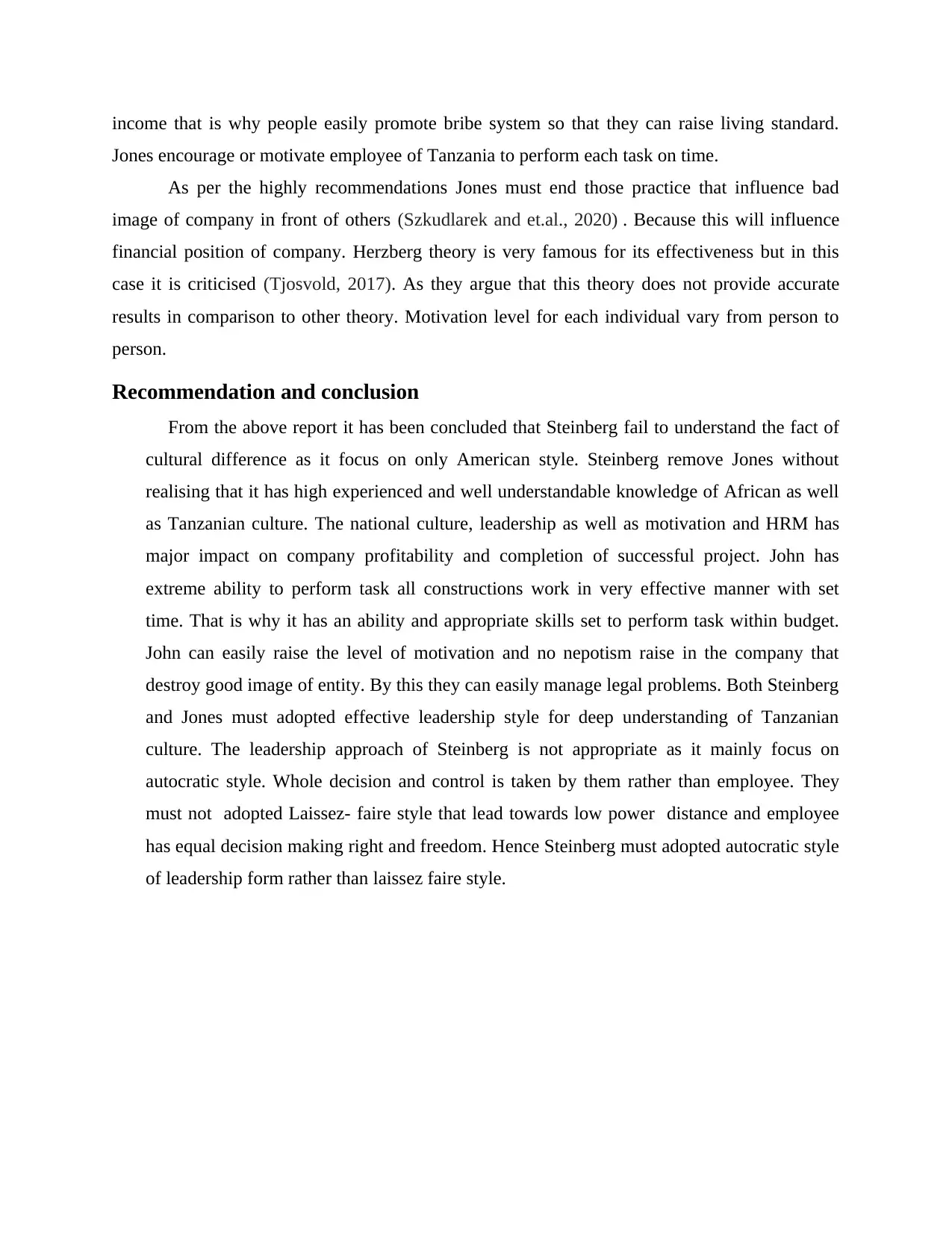
income that is why people easily promote bribe system so that they can raise living standard.
Jones encourage or motivate employee of Tanzania to perform each task on time.
As per the highly recommendations Jones must end those practice that influence bad
image of company in front of others (Szkudlarek and et.al., 2020) . Because this will influence
financial position of company. Herzberg theory is very famous for its effectiveness but in this
case it is criticised (Tjosvold, 2017). As they argue that this theory does not provide accurate
results in comparison to other theory. Motivation level for each individual vary from person to
person.
Recommendation and conclusion
From the above report it has been concluded that Steinberg fail to understand the fact of
cultural difference as it focus on only American style. Steinberg remove Jones without
realising that it has high experienced and well understandable knowledge of African as well
as Tanzanian culture. The national culture, leadership as well as motivation and HRM has
major impact on company profitability and completion of successful project. John has
extreme ability to perform task all constructions work in very effective manner with set
time. That is why it has an ability and appropriate skills set to perform task within budget.
John can easily raise the level of motivation and no nepotism raise in the company that
destroy good image of entity. By this they can easily manage legal problems. Both Steinberg
and Jones must adopted effective leadership style for deep understanding of Tanzanian
culture. The leadership approach of Steinberg is not appropriate as it mainly focus on
autocratic style. Whole decision and control is taken by them rather than employee. They
must not adopted Laissez- faire style that lead towards low power distance and employee
has equal decision making right and freedom. Hence Steinberg must adopted autocratic style
of leadership form rather than laissez faire style.
Jones encourage or motivate employee of Tanzania to perform each task on time.
As per the highly recommendations Jones must end those practice that influence bad
image of company in front of others (Szkudlarek and et.al., 2020) . Because this will influence
financial position of company. Herzberg theory is very famous for its effectiveness but in this
case it is criticised (Tjosvold, 2017). As they argue that this theory does not provide accurate
results in comparison to other theory. Motivation level for each individual vary from person to
person.
Recommendation and conclusion
From the above report it has been concluded that Steinberg fail to understand the fact of
cultural difference as it focus on only American style. Steinberg remove Jones without
realising that it has high experienced and well understandable knowledge of African as well
as Tanzanian culture. The national culture, leadership as well as motivation and HRM has
major impact on company profitability and completion of successful project. John has
extreme ability to perform task all constructions work in very effective manner with set
time. That is why it has an ability and appropriate skills set to perform task within budget.
John can easily raise the level of motivation and no nepotism raise in the company that
destroy good image of entity. By this they can easily manage legal problems. Both Steinberg
and Jones must adopted effective leadership style for deep understanding of Tanzanian
culture. The leadership approach of Steinberg is not appropriate as it mainly focus on
autocratic style. Whole decision and control is taken by them rather than employee. They
must not adopted Laissez- faire style that lead towards low power distance and employee
has equal decision making right and freedom. Hence Steinberg must adopted autocratic style
of leadership form rather than laissez faire style.
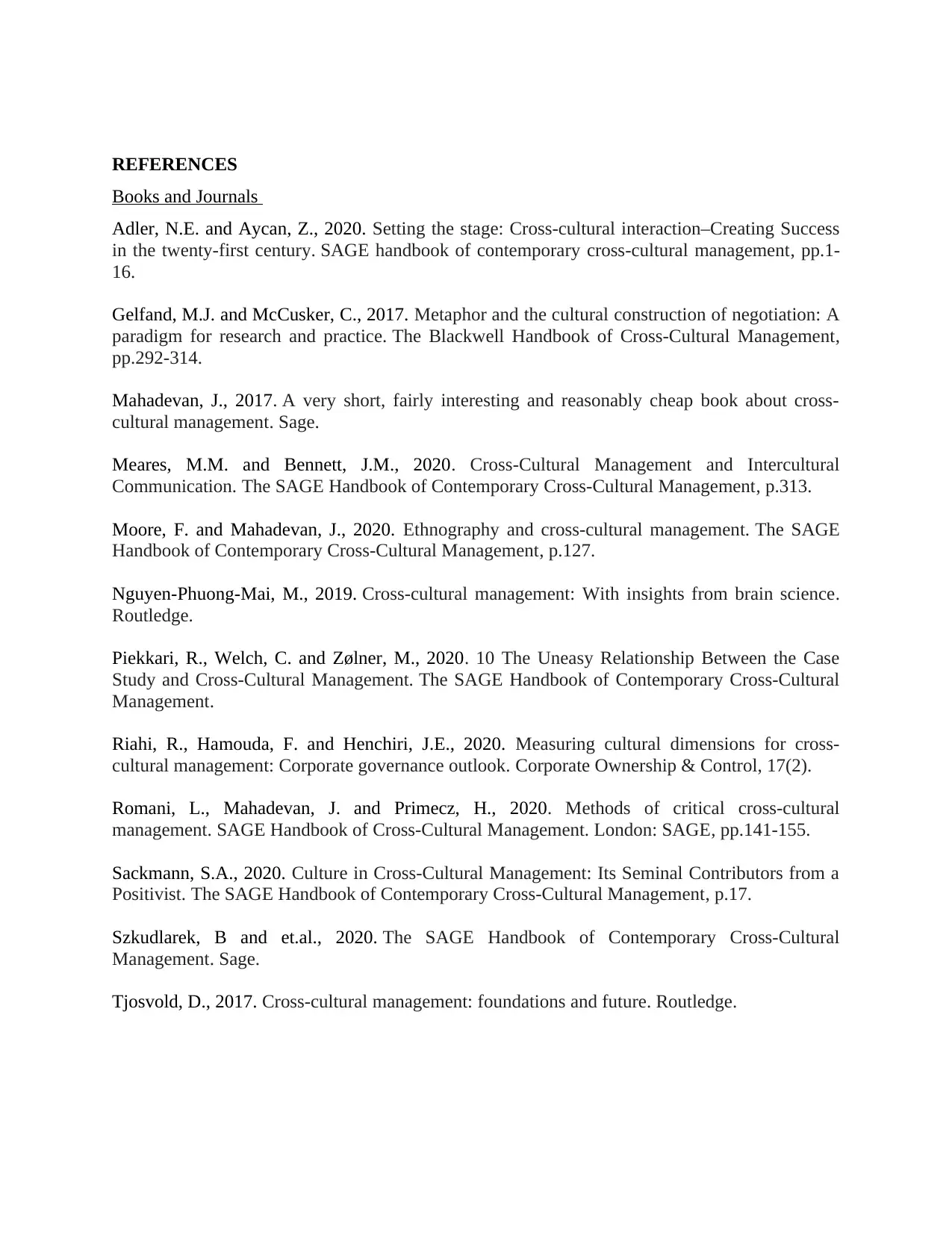
REFERENCES
Books and Journals
Adler, N.E. and Aycan, Z., 2020. Setting the stage: Cross-cultural interaction–Creating Success
in the twenty-first century. SAGE handbook of contemporary cross-cultural management, pp.1-
16.
Gelfand, M.J. and McCusker, C., 2017. Metaphor and the cultural construction of negotiation: A
paradigm for research and practice. The Blackwell Handbook of Cross‐Cultural Management,
pp.292-314.
Mahadevan, J., 2017. A very short, fairly interesting and reasonably cheap book about cross-
cultural management. Sage.
Meares, M.M. and Bennett, J.M., 2020. Cross-Cultural Management and Intercultural
Communication. The SAGE Handbook of Contemporary Cross-Cultural Management, p.313.
Moore, F. and Mahadevan, J., 2020. Ethnography and cross-cultural management. The SAGE
Handbook of Contemporary Cross-Cultural Management, p.127.
Nguyen-Phuong-Mai, M., 2019. Cross-cultural management: With insights from brain science.
Routledge.
Piekkari, R., Welch, C. and Zølner, M., 2020. 10 The Uneasy Relationship Between the Case
Study and Cross-Cultural Management. The SAGE Handbook of Contemporary Cross-Cultural
Management.
Riahi, R., Hamouda, F. and Henchiri, J.E., 2020. Measuring cultural dimensions for cross-
cultural management: Corporate governance outlook. Corporate Ownership & Control, 17(2).
Romani, L., Mahadevan, J. and Primecz, H., 2020. Methods of critical cross-cultural
management. SAGE Handbook of Cross-Cultural Management. London: SAGE, pp.141-155.
Sackmann, S.A., 2020. Culture in Cross-Cultural Management: Its Seminal Contributors from a
Positivist. The SAGE Handbook of Contemporary Cross-Cultural Management, p.17.
Szkudlarek, B and et.al., 2020. The SAGE Handbook of Contemporary Cross-Cultural
Management. Sage.
Tjosvold, D., 2017. Cross-cultural management: foundations and future. Routledge.
Books and Journals
Adler, N.E. and Aycan, Z., 2020. Setting the stage: Cross-cultural interaction–Creating Success
in the twenty-first century. SAGE handbook of contemporary cross-cultural management, pp.1-
16.
Gelfand, M.J. and McCusker, C., 2017. Metaphor and the cultural construction of negotiation: A
paradigm for research and practice. The Blackwell Handbook of Cross‐Cultural Management,
pp.292-314.
Mahadevan, J., 2017. A very short, fairly interesting and reasonably cheap book about cross-
cultural management. Sage.
Meares, M.M. and Bennett, J.M., 2020. Cross-Cultural Management and Intercultural
Communication. The SAGE Handbook of Contemporary Cross-Cultural Management, p.313.
Moore, F. and Mahadevan, J., 2020. Ethnography and cross-cultural management. The SAGE
Handbook of Contemporary Cross-Cultural Management, p.127.
Nguyen-Phuong-Mai, M., 2019. Cross-cultural management: With insights from brain science.
Routledge.
Piekkari, R., Welch, C. and Zølner, M., 2020. 10 The Uneasy Relationship Between the Case
Study and Cross-Cultural Management. The SAGE Handbook of Contemporary Cross-Cultural
Management.
Riahi, R., Hamouda, F. and Henchiri, J.E., 2020. Measuring cultural dimensions for cross-
cultural management: Corporate governance outlook. Corporate Ownership & Control, 17(2).
Romani, L., Mahadevan, J. and Primecz, H., 2020. Methods of critical cross-cultural
management. SAGE Handbook of Cross-Cultural Management. London: SAGE, pp.141-155.
Sackmann, S.A., 2020. Culture in Cross-Cultural Management: Its Seminal Contributors from a
Positivist. The SAGE Handbook of Contemporary Cross-Cultural Management, p.17.
Szkudlarek, B and et.al., 2020. The SAGE Handbook of Contemporary Cross-Cultural
Management. Sage.
Tjosvold, D., 2017. Cross-cultural management: foundations and future. Routledge.
⊘ This is a preview!⊘
Do you want full access?
Subscribe today to unlock all pages.

Trusted by 1+ million students worldwide
1 out of 9
Related Documents
Your All-in-One AI-Powered Toolkit for Academic Success.
+13062052269
info@desklib.com
Available 24*7 on WhatsApp / Email
![[object Object]](/_next/static/media/star-bottom.7253800d.svg)
Unlock your academic potential
Copyright © 2020–2026 A2Z Services. All Rights Reserved. Developed and managed by ZUCOL.





